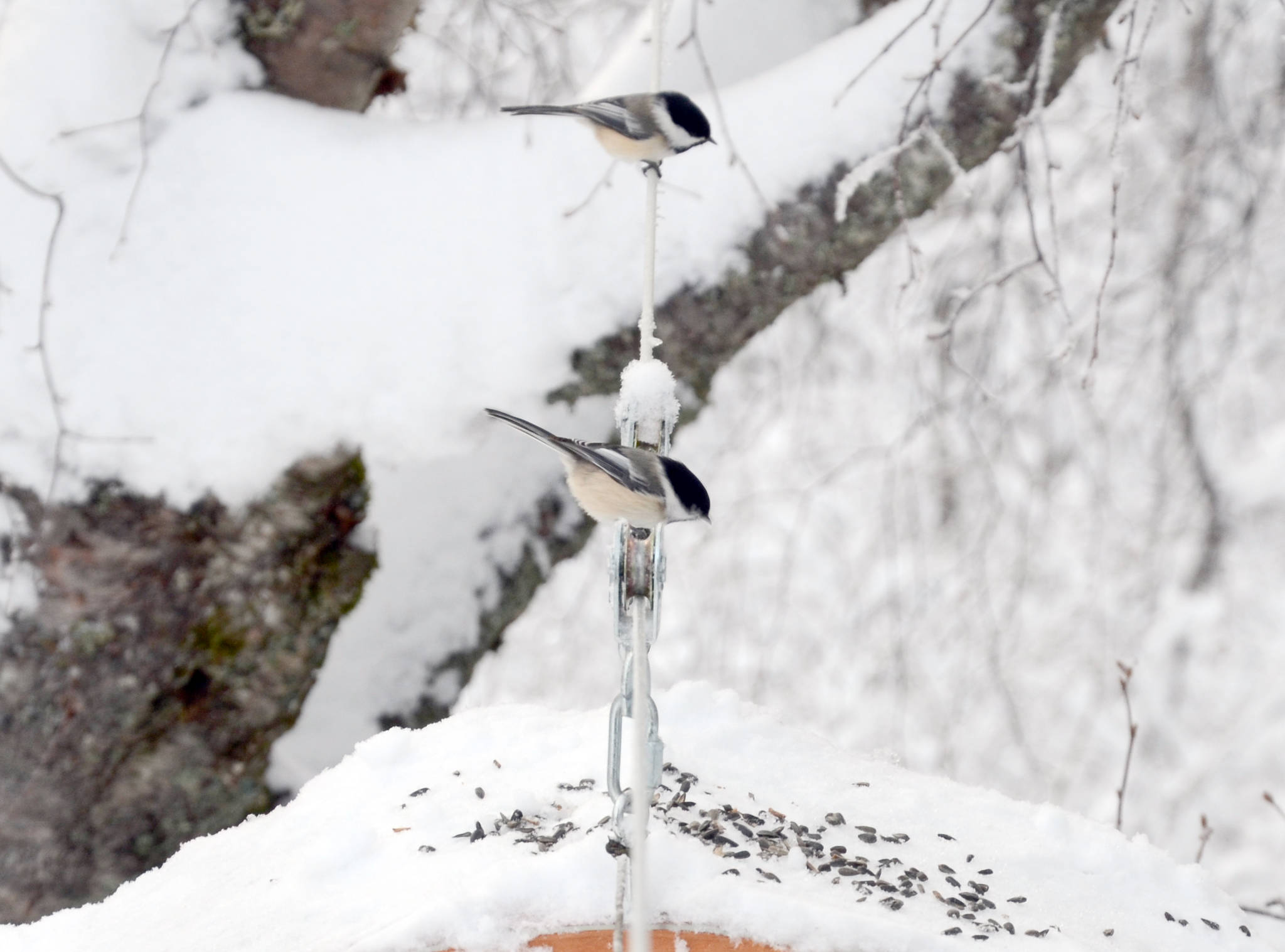By TODD ESKELIN
As the snow continues to pile up, I have had some unwanted guests at my bird feeder. A cow moose and her stubborn little calf have been visiting in the cloak of darkness and eating all my bird seed.
My intent was to feed birds, not moose, so for now I have suspended my feeding operation until I get a better system they cannot reach. Times can get tough, but moose are better off foraging on their own than supplementing with sunflower seeds. However, there can be unintended consequences when we dabble with things like supplemental feeding.
My break from watching the birds gave me a chance to dig into the research and address some of those nagging questions that always come up about feeding birds. Does it help them? Will they become dependent on my feeder? Will it shortstop birds and keep them from migrating?
I found more substantive research on the issue since the last time I did this exercise, but you be the judge and jury as to its appropriateness for your yard. There are several very nice papers describing methods to measure if fed birds become dependent on the artificial food source. It basically comes down to how you measure success in a wild bird.
In my mind, birds have two main goals to evaluate success. They must survive from year to year. This is pretty obvious — if you die, you failed at your mission.
Second, they must rear young to replace themselves when they do die and they must raise more than two in their lifetime if they are to grow their population or account for a percentage of their offspring not making it to rear their own young.
A paper by Egan and Brittingham in 1994 measured monthly survival rates of fed and unfed Black-capped Chickadees in Pennsylvania and found that feeding had significantly increased the short-term survival of these birds.
Brittingham and Temple had previously looked at dependency on feeders by taking feeders away from fed populations of chickadees and found that there was no difference in survival rates between fed birds that were cut off and unfed birds.
Many other researchers have documented problems associated with feeding including increased predation by both wild and domestic species, disease and parasite transmission, nontarget species congregating at supplemental feeding sites (my moose problem) and increased window strikes.
The ongoing deformed bill problem seen in chickadees in Southcentral Alaska appears to be the result of a virus and was first identified at feeders. Questions still remain as to how it is transmitted as it is also prevalent in wild populations, far from any contact with feeders (https://mbio.asm.org/content/7/4/e00874-16).
On the pro side, many relevant papers describe the economic value of feeding, which is a multibillion dollar industry in the United States. About 40 percent of American households routinely provide food for birds.
In addition to the economic value, there are social implications to the value people derive from feeding birds because an appreciation is gained that is only possible from watching birds at close range outside their windows.
We will likely never know what goes on inside bird brains, so a definitive answer as to whether birds “decide” not to migrate because of supplemental feeding is nebulous. We do know that migrant birds like hummingbirds and sparrows that visit feeders continue to migrate and return.
Banded birds have returned to feeders up to eight years, only during migration. So we have to presume that this is not an issue.
It is obvious there are many pros and cons to this activity. I think the best way to go about this business is to make sure you are doing everything you can to protect the safety and well-being of the birds you feed.
Some people may decide against feeding, alternatively landscaping their backyard environment to support more birds “naturally.” Some do’s and don’ts to supplemental bird feeding are provided below.
1. Do not feed birds if you have a domestic cat that you allow to go outside unaccompanied.
2. Remove feeders at appropriate times in the spring to avoid unwanted visitors like bears.
3. Clean your feeders regularly to reduce disease and parasite transmission.
4. If you see sick birds or predators hanging around, pull feeders so you are not contributing to unnaturally concentrating birds.
5. In addition to the feeders, provide shrub cover or brush piles nearby, giving birds hiding spots from avian predators.
If you would like more info on best practices for feeding birds during inclement weather, this article is a good read; https://www.birdwatchersdigest.com/bwdsite/learn/top10/top-10-ways-to-help-birds-in-bad-weather.php .
If supplemental feeding is just too much work or not your thing, but you want to create a bird friendly yard and the following link has some great info on things to consider; https://www.audubon.org/magazine/july-august-2013/how-create-bird-friendly-yard .
Todd Eskelin is a Wildlife Biologist at Kenai National Wildlife Refuge. Find more Refuge Notebook articles (1999-present) at https://www.fws.gov/Refuge/Kenai/community/Refuge_notebook.html or other info at http://www.facebook.com/kenainationalwildliferefuge.

